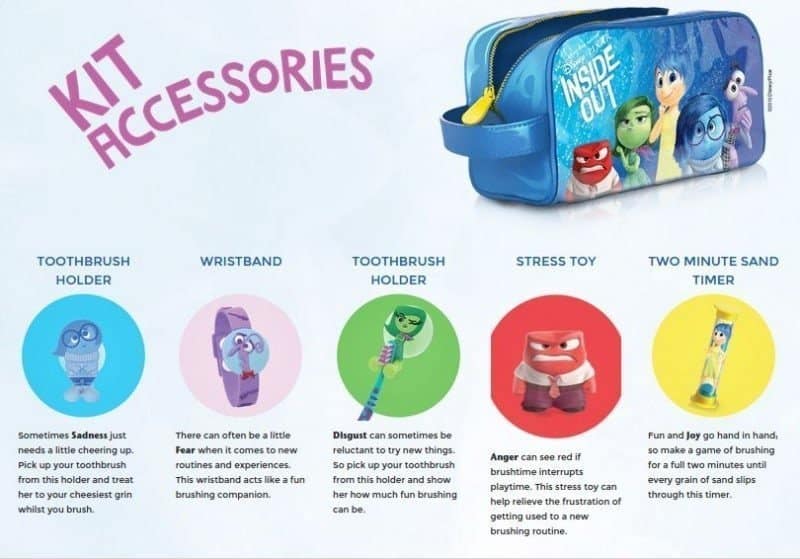A new report titled ‘Inside Brushtime’ commissioned by Aquafresh (www.aquafreshbrushtime.co.uk) has revealed 80 per cent of children throw temper tantrums and experience anger at brushtime, meaning that one in 10 parents are sending their children to bed without brushing their teeth. Just over 25 per cent of the parents surveyed said they do not believe their children brush their teeth correctly, and just under half (42%) confessed they have to force their children to clean their teeth. Aquafresh hopes that the Inside Brushtime report will help parents to better navigate the emotional rollercoaster of ‘brushtime’ and enable them to establish an effective oral health care regime.
To help encourage your little ones with Brushtime why not see if you can win a FREE Brushtime Kit from Disney and Aquafresh via your local supermarket.

10 top tips to encourage better brushtime from Child Behavioural Expert Lorraine Thomas:
- Great habits are caught not taught – take a close look at your own dental habits and make sure they are good enough to pass on.
- Make brush time fun and brush your teeth when they brush theirs. Your child loves your attention and here is an ideal opportunity to enjoy time together. Choose a time when you are relaxed – not rushing to get out to the office or school – or tired at the end of a long day. Brush your teeth at the same time as they are brushing theirs. Take it in turns to brush each other’s teeth (prepare to get a bit wet!). Encourage them to open their mouths wide by roaring like a lion. The bathroom can be a real centre for the family and it is important to have fun there.
- Show and tell them what you want them to do. Explain to your child what to do rather than what not to do. Parents find giving negative instructions stressful. And children find negatives very difficult to process. So rather than say ‘don’t forget to clean your back teeth’, say ‘remember to clean your back teeth’. Rather than say ‘don’t rush’ say ‘take your time and feel each tooth’.
- Behaviour that gets attention gets repeated so catch your child ‘red-handed’ brushing their teeth well. Sometimes we tend to focus on the times our children aren’t doing what we want them to do and give them attention for the behaviour we want to discourage, e.g. “you aren’t cleaning your teeth properly”. When you see them holding their brush, concentrating on squeezing the toothpaste and making an effort – praise them. Describe what you are seeing them do and be as specific as you can and they will be much more likely to do it again.
- Use apps, egg timers, gizmos and gadgets. Children have a very different concept of time from us. They may find it helpful to use the Aquafresh Brushtime App, a giant egg timer (or your kitchen one) or a musical toothbrush to help them understand how long they are supposed to brush for. Star charts and stickers can be powerful motivators, especially for young children. Location is important, so find a place for the sticker chart in the bathroom.
- Give instructions one at a time and use visual maps. Children have to develop their memory and this takes time. If you say to them, ‘go upstairs, wash your face and clean your teeth’ – they may get upstairs and genuinely have forgotten what they are supposed to be doing. Make instructions simple and young children will often find a visual map a really helpful way to reinforce spoken instructions. You can make these simply by getting them to draw pictures of what you want them to do in the morning or evening, have a family ‘photo shoot’ or have fun cutting pictures from magazines. You can laminate the pictures if you are feeling adventurous or blu tac them onto the fridge or wardrobe.
- Enlist the help of a sibling or encourage a sleepover friend who is a good tooth brusher. Peer influence is powerful and if your child is reluctant having a brother, sister or buddy who enjoys cleaning their teeth can really help
- Give choices and responsibility when you are teaching them. Say to them, ‘would you like to clean your teeth first or put on your pyjamas?’ They are going to do both anyway, but if they are in control and in the driving seat making choices – they are much likely to make it happen.
- Get into the habit of using ‘when’ and ‘then’ – especially if ‘brushtime’ is a struggle – rather than threats and ultimatums … ‘if you don’t do this … you can’t have that’. So say ‘when you have cleaned your teeth, then we can have a cuddle and a story.’
- Share books that involve teeth cleaning stories. Try ‘Brush Your Teeth Please’ by Leslie McGuire. It’s a pop-up book that is great fun and practical. I also like Ladybird’s Peppa Pig Dentist trip.
How do you encourage brushtime?
Disclosure: We received two Brushtime kits from Disney and Aquafresh FOC for the purpose of the this post





























No Comments